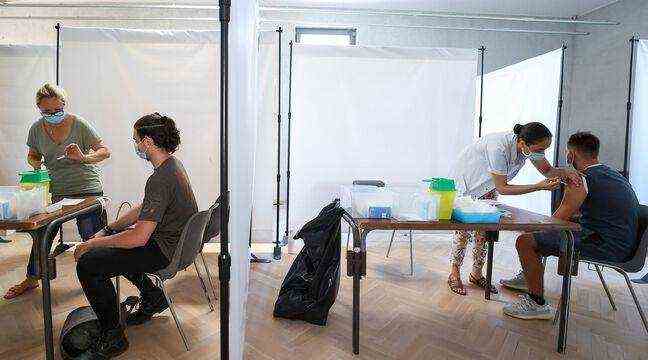Since the announcement of the health pass, vaccination against Covid-19 has continued to slow down. The extension of the measure to cafes, restaurants and trains does nothing. The French prefer to carry out the screening tests set up in pharmacies and in analysis laboratories.
Screening tests: winners of this fourth wave
Pharmacists and biologists thought they had reached their limits, with 4.2 million tests validated in the first week of August. The record was however exceeded the following week, with 5.7 million screenings, punctuated by the extension of the health pass and the weekend of August 15.
This meteoric growth is not to be blamed on medical analysis laboratories, which still cap at nearly 2 million weekly PCR tests. “We are really at the peak of our abilities and it will be very complicated to go beyond”, confirms Henry-Pierre Doermann, vice-president of the union of biologists.
In pharmacies, “we have managed to do more”, in the order of 3 million antigenic tests, specifies Philippe Besset, president of the FSPF union. A “maximum” that he also considers difficult to exceed since out of a total of 21,000 pharmacies, only 12,000 pharmacies are involved in screening.
However, this remains insufficient in the face of “very strong demand” which seems to be maintained “at about the same level” in recent days, he notes. According to him, this explains the appearance of new screening points, “barnums which have prospered a lot recently”.
The giant failure of the computer system allowing pharmacists to issue health passes was partly caused by the rush of the population to take the tests. An incident that occurred on Friday the 13th, a day marked by a peak at more than a million tests.
The French are less and less attracted by vaccination
If the announcement of the health pass by Emmanuel Macron in mid-July took the vaccination campaign to unprecedented heights, “the boost effect is starting to weaken”, recognizes the Ministry of Health.
In three weeks, the number of weekly injections fell from 4.8 to 3.2 million, without the extension of the pass reversing the trend, still slightly down (-4%) from Monday to Thursday compared to the previous week, according to the daily reports of the General Directorate of Health (DGS).
At the heart of the summer holidays, the fall is dizzying for the first doses, from 2.6 million at the end of July to 1.1 million last week and still in sharp decline (-27%) this week.
Despite everything, the ministry considers “attainable” the objective, envisaged by the Head of State, of 50 million first-time vaccinated at the end of August, estimating that it is “not at all excluded that we are witnessing a rebound as the start of the school year “.
Appointments keep falling, from 3 million in the wake of the President of the Republic’s speech to just over 700,000 last week and even less (-22%) since Monday, according to Doctolib, which predicts that the executive’s target will be reached on September 4.
What will be the measures for the start of the school year?
The dynamics of vaccination raises questions for the rest of the campaign. At this stage, the Ministry of Health claims to aim for “the highest possible rate” among the almost 58 million eligible French people (12 years and over).
If large contingents remain among people over 80 years of age and chronically ill “at risk”, the executive is primarily focused on the pool of adolescents, who do not shy away from the bite: 55% of 12-17 year olds have already received a dose, leaving more than 2 million to be vaccinated.
Middle school and high school students will therefore be particularly targeted from September, via group outings to vaccination centers, or mobile teams of caregivers extended to schools.
The uncertainty remains total on the resumption of screening tests for students, from kindergarten to baccalaureate: salivary PCR or antigenic self-tests? starting at what age? and how much per week? “We lack visibility”, regrets the biologist Henry-Pierre Doermann, who expects a return “complicated because we will have to adapt very quickly”.

